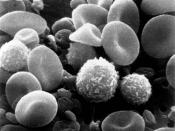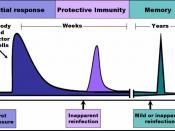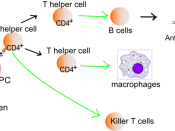�PAGE � �PAGE �1� Immune System
Immune System
�
Immune System
The immune system protects our body from the infection of virus, bacteria, fungi and some other parasites. The cells of immune system have the ability to surround the bacteria, kill parasites, tumor cells or viral/bacterial infected cells (Linnemeyer, 1993). The immune system of a human being is remarkable effective. Antigen is a substance which obtains immune response in human body. The parts of an immune system are:
Antigen specific (which identify a particular antigen and act against it)
Systematic (Works throughout the body)
Memory (identifies and accumulates a stronger attack to the antigen next time)
Every cell in the immune system displays a marker that is based on the Major Histocompatibility Complex (MHC). The display helps in self or non-self recognition. The non-self cells are treated as enemies and attacked effectively. Sometimes, self cells are attacked by the immune system itself due to the process break down, which is called autoimmune disease.
Systemic lupus erythematosus, multiple sclerosis and some types of arthritis and diabetes are some examples of autoimmune diseases (Immune System, 2001).
52-62% of human blood is composed by plasma liquid and 38-48% of blood by cells. 7% weight of the body of an average person is constituted by 5 liters of blood. The pH of blood is 7.40, which mean blood is alkaline in nature. Density of the blood is 1.057, which shows it is heavier than water. The immune cells are found in bone marrow mainly. All these properties of blood make it able as a carrier of immune system.
Humoral Immunity
Humoral immunity depends on the B-cells of immune system. B-cells are lymphocytes which are responsible for the production of antibodies that works against an antigen. Stem cells of the bone marrow are the...


